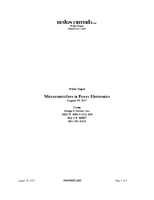Delcam Supports Award-Winning Hamuel Hybrid Repair Machine
Share:
Delcam's CADCAM software is at the heart of a new hybrid repair machine launched by Hamuel Maschinenbau on stand B63 in hall 13 at the EMO exhibition in Hannover. The significance of the new machine was recognised with an EMO Award from industry magazine MM Maschinenmarkt.
The Hamuel hybrid machine is capable of remanufacturing high-value metal components, such as turbine blades, in order to give them a second life instead of manufacturing new parts. This gives a decisive cost advantage, in particular when high-value and complex-shaped components are concerned.
The machine combines five technologies in one unit – five-axis CNC milling, laser cladding, robot polishing, inspection and laser marking. Any of these processes can be combined, as required by the particular project. The equipment costs only a fraction of the price of a multi-machine repair cell, as well as saving on floor space.
Automatic methods developed by Hybrid Manufacturing Technologies allow the Hamuel equipment to change between manufacturing processes as easily as a conventional machine can change between milling cutters. Changeover takes less than ten seconds typically and can be called up during any part program using only a few M-codes.
Another partner in the development, the Manufacturing Technology Centre in Coventry, has been responsible for the 3D laser cladding element. Laser cladding is essentially a welding-based method of additive manufacturing that allows high-integrity material to be deposited onto the part being repaired. It can be carried out with virtually all conventional welding metals, with the focused heat input allowing cladding of even difficult-to-weld materials.
A typical application for the machine is the repair of a worn blade on an impeller. Using a hybrid machine, it is possible to remove the damaged area by milling off the worn material and then build the material back up using the cladding technology. A second machining operation, using high-speed five-axis milling, then produces the final shape, with a smooth transition between the original part and the new material. Polishing and laser marking can be undertaken to complete the component, if required. In-cycle part inspection, using Delcam's adaptive machining software, provides feedback to orientate the parts, assess defects, and ensure accuracy throughout the various stages.
The adaptive machining software also customises the NC program to repair each component on an individual basis. It ensures that the machine delivers exceptional accuracy and reliability, even when repairing parts with varied service histories. In addition, the ability to undertake multiple processes without having to remove the part from the machine supports higher precision, repeatability and reproducibility.
While the initial aim is to produce a component "as good as new", at a fraction of the cost of manufacturing a new part, the cladding operation can even produce parts with improved technical characteristics. Laser cladding allows super alloys to be used for specific sections of the blade profile to enhance the performance and improve the properties of the component. This targeted cladding with an enhanced material can result in superior durability over the original material.
For further information on Delcam and its CAM software, please contact:
Peter Dickin, Marketing Manager
Direct phone: 44-0-121-683-1081Â
e-mail: marketing@delcam.com
Delcam plc Â
Small Heath Business Park,  Â
Birmingham, B10 0HJ, UK
www.delcam.com




